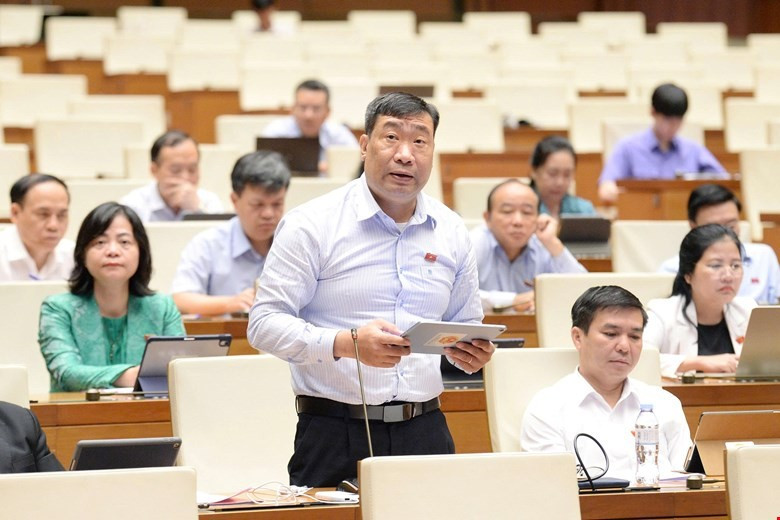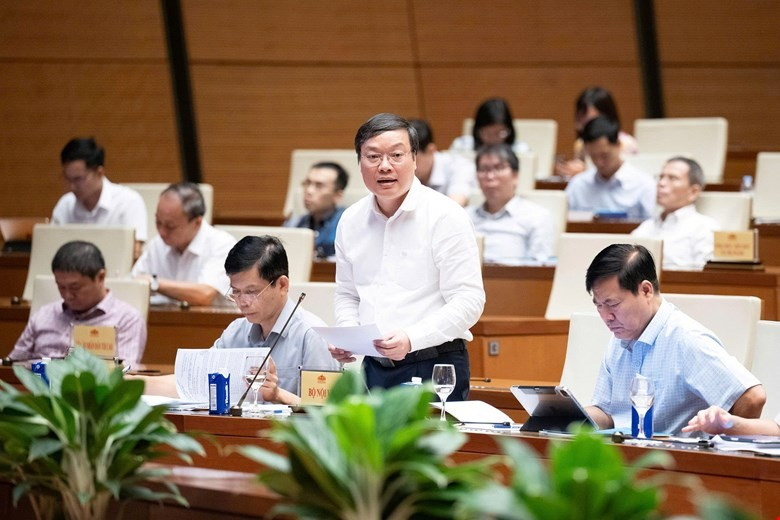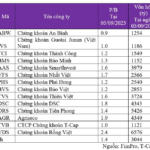Transparent Allocation of Revenue Sources
On the morning of October 1st, the Specialized National Assembly Delegates Conference discussed the draft amended Civil Servant Law. Contributing to the draft, Delegate Thach Phuoc Binh (Vinh Long delegation) noted that the draft law has expanded the scope of salary sources, not only from the salary fund of public service units but also from other legal sources.

Delegate Thach Phuoc Binh. Photo: QH
According to him, this is a significant step forward, allowing civil servants to enjoy more diverse income. However, he pointed out that the draft law does not clearly outline a transparent mechanism for revenue allocation or ensure fairness among civil servants working in units with different conditions. Without specific regulations, significant income disparities may arise, leading to inequality.
Based on this analysis, he proposed that the law should include principles of fair distribution linked to additional income based on work efficiency. Additionally, there should be mandatory provisions for financial transparency and public disclosure to ensure fairness.
The delegate from Vinh Long also noted that the draft law does not clarify the bonus mechanism or distinguish clearly between basic salary and additional income. He argued that vague regulations would make it difficult for units to establish internal spending rules, potentially leading to complaints and disputes.
Mr. Binh suggested adding a mechanism for allocating bonus funds based on work efficiency, granting units autonomy in distribution, but requiring transparency and linkage to annual civil servant performance evaluations.
Regarding civil servant recruitment, the draft law changes the basis of recruitment to job positions, salary funds, and legal revenue sources, instead of solely relying on professional titles as in the current law. While acknowledging this as an important change that aligns recruitment with actual needs, Mr. Binh noted that the recruitment process remains burdened by administrative procedures and lacks the flexibility needed to attract talent.
He proposed expanding the mechanism for directly accepting experts, scientists, and talented individuals. Additionally, he suggested further decentralization to grant public service units more autonomy in recruitment, coupled with accountability measures.
Clear Appointment Authority Regulations
During the session, Delegate Nguyen Van Manh (Phu Tho delegation) raised concerns about the draft law’s provision that civil servants appointed to management positions are appointed by the competent authority, without specifying which authority level is responsible.
Noting that it remains unclear who appoints these positions in public service units and commune-level educational institutions, the delegate urged a detailed study and specific regulations on the decentralization of appointments for leaders of public service units.
This amendment also allows civil servants to sign labor contracts and participate in the management and operation of non-public enterprises, provided it does not violate the law.
According to Thach Phuoc Binh, without strict control, this could lead to conflicts of interest, as civil servants might exploit their positions for personal gain.
He proposed specifying the fields and industries in which civil servants are permitted to participate, along with requiring transparent reporting and oversight by the managing unit.

Deputy Minister of Home Affairs Truong Hai Long.
In response, Deputy Minister of Home Affairs Truong Hai Long stated that contracts for civil servants are a critical issue, as civil servants, upon recruitment, exercise all rights, obligations, and responsibilities as per their contracts.
He explained that the Civil Servant Law includes provisions for labor contracts and service contracts to ensure flexibility and protect the rights of civil servants when entering into work agreements.
The Deputy Minister affirmed that the drafting agency would incorporate feedback to enhance control, oversight, and accountability mechanisms, preventing the misuse of authority in professional activities.
Unraveling the Surge: Decoding Vingroup’s Stock Market Heatwave
VIC shares are taking center stage in the stock market, having reached new highs four times in just two weeks, peaking at 153,200 VND per share. Following unfounded rumors about its financial health, the Group’s decisive legal action on September 8, 2025, not only restored confidence but also delivered a significant boost to the stock price.
“T-Cap Securities Lifts Foreign Ownership Limit to 100%”
With this decision, T-Cap joins the ranks of brokerage firms opting to raise their foreign ownership limits to the absolute maximum.
The Ultimate Guide to IR for Small and Medium-Sized Businesses
Investor Relations (IR) cannot be an effective, efficient, and results-driven activity if it is merely considered a “side task” for the accounting department or corporate secretary. True investor confidence is built when IR is recognized by leadership as a long-term strategy intertwined with sustainable development, rather than a “short-term campaign” solely focused on equity issuance.




















